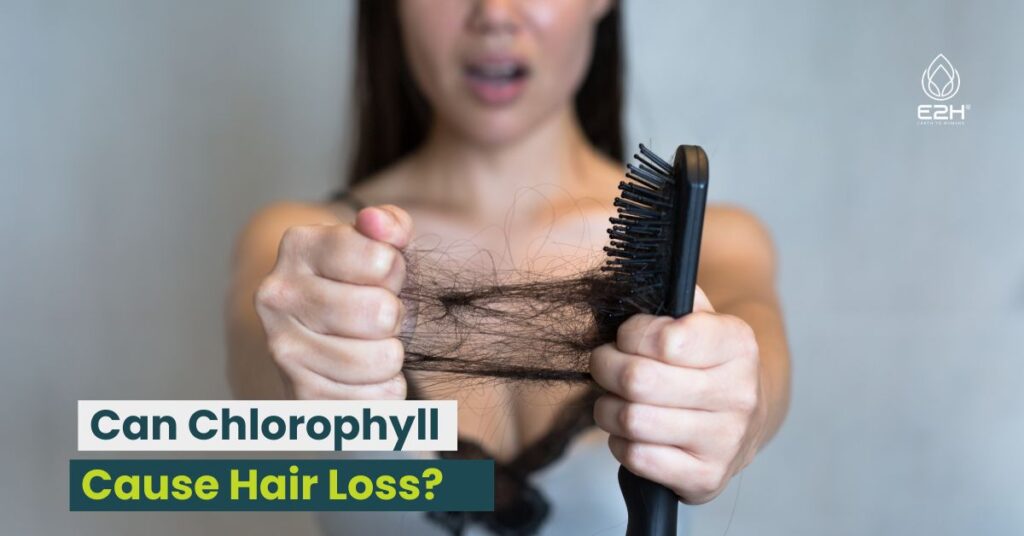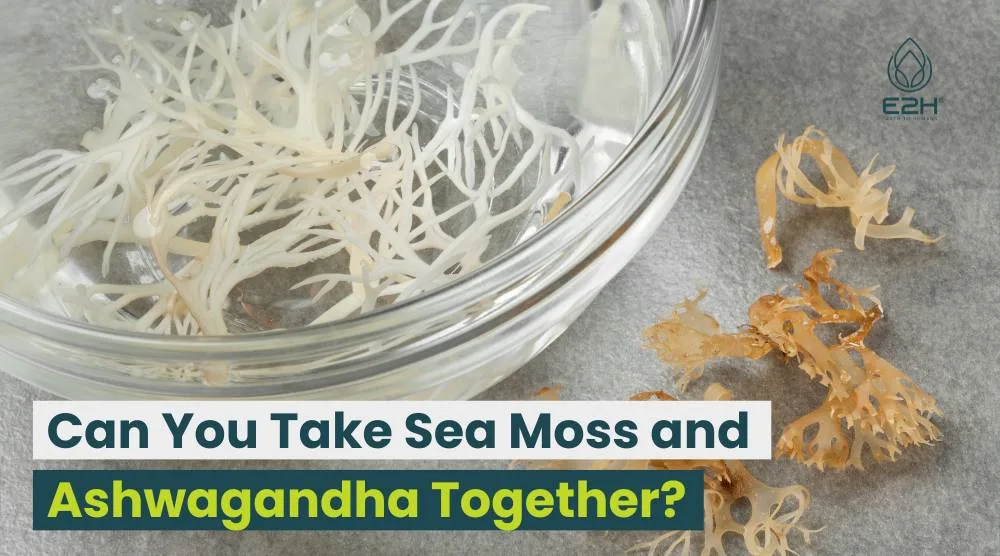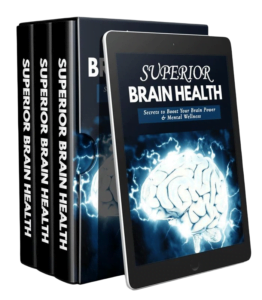No, there is no scientific evidence to suggest that chlorophyll causes hair loss. Hair loss is caused by various factors such as genetics, hormonal imbalances, stress, and medical conditions.
What is Chlorophyll?
Chlorophyll is a very green color pigment found in plants, some other green plants, some green algae,, and cyanobacteria. It is essential for photosynthesis, the process by which plants convert sunlight into energy. Chlorophyll absorbs light energy from the sun and uses it to create glucose and oxygen, which are then used by the plant for energy.
Can Chlorophyll cause Hair Loss?
There is no scientific proof to suggest that chlorophyll causes hair loss. Chlorophyll is a natural pigment founds in plants that is used as a food coloring and dietary supplement. It has been extensively studied for its potential health benefits and is generally considered safe for consumption.
Hair loss can be caused by various factors such as genetics, hormonal imbalances, stress, and medical conditions. While there is no evidence to suggest that chlorophyll is a contributing factor to hair loss, there are several lifestyle factors that can lead to hair loss. These include poor nutrition, excessive heat styling, chemical treatments, and stress.
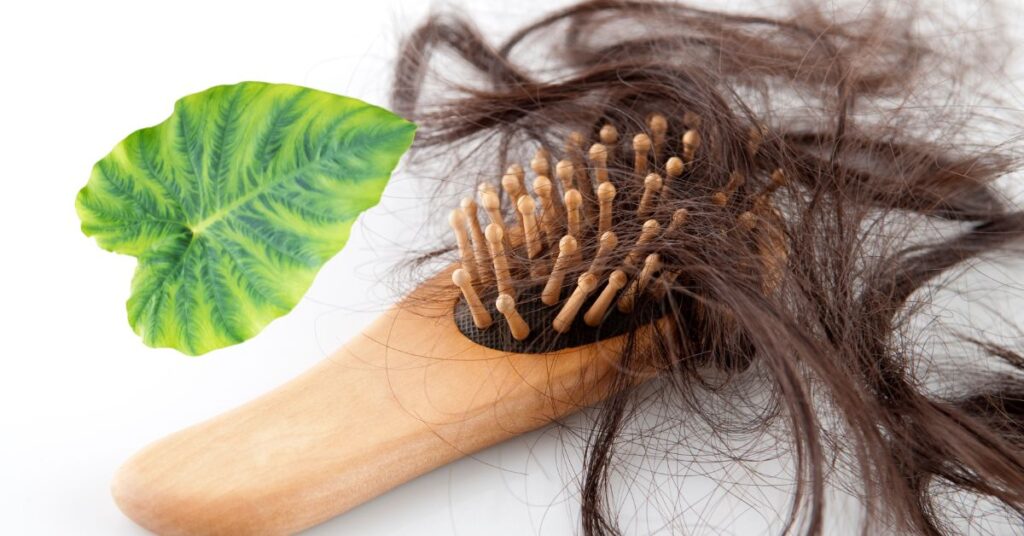
To maintain healthy hair, it is important to follow a balanced diet rich in nutrients such important minerals such as protein, iron, and vitamin D. Additionally, to produce healthy hair, it is recommended to limit the use of heat styling tools and chemical treatments, and to manage stress through techniques such as meditation, yoga, or exercise.
In conclusion, while chlorophyll is generally safe and has several potential health benefits, it is unlikely to cause hair loss. Taking steps to maintain a healthy lifestyle and avoiding harsh hair care practices can help with your natural chlorophyll, and prevent hair damage or slow down hair loss.
How is Chlorophyll used?
Chlorophyll is a natural pigment found in plants that is commonly used as a food coloring and dietary supplement. It is available in various forms, including liquid, powder, and capsules. Liquid chlorophyll is typically added to water or other beverages and consumed as a supplement. It can also be used as a natural food coloring agent in recipes.
Chlorophyll powder is often used as an ingredient in smoothies, juices, and other recipes. It can also be taken as a dietary supplement in capsule form. Chlorophyll is also available as a topical cream or ointment and may be used for wound healing and skin conditions. Overall, chlorophyll is a versatile and natural supplement that can be used in various ways to promote health and wellness.
How does Hair Loss Occur?
Hair loss occurs when hair follicles stop producing hair, resulting in thinning or baldness. The most common type of this hair follicle loss is androgenetic alopecia, which is also known as male or female pattern baldness. This type of hair loss is caused by a combination of genetic and hormonal factors.
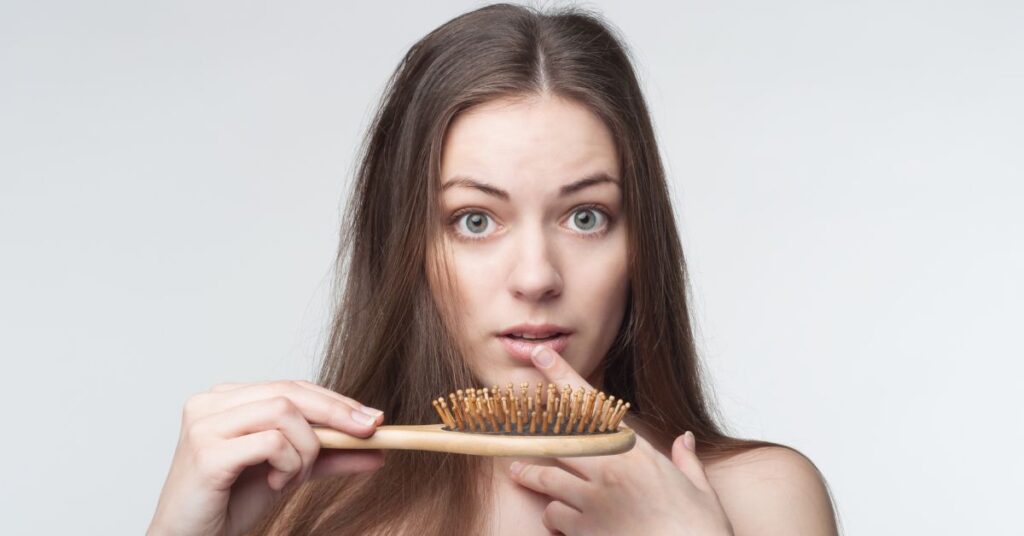
Other causes of hair loss include medical conditions such as thyroid disease, autoimmune and blood circulation disorders prevent infections, and scalp infections. Certain medications such as chemotherapy drugs and beta-blockers can also cause hair loss.
Hair and grey hair loss can also be caused by lifestyle factors such hair issues such as poor nutrition, stress, and harsh hair care practices. Excessive heat styling, chemical treatments, and tight hairstyles can damage hair and lead to breakage and hair loss.
Factors that can Cause Hair Loss
Hair loss can be caused by a variety of factors, including:
- Genetics: Hair loss can be inherited from either parent. Male pattern baldness is the most common form of hair loss in men, while female pattern baldness is the most common form of hair loss in women.
- Hormonal imbalances: Hormonal changes can cause hair loss. For example, women may experience hair loss during menopause due to a decrease in estrogen levels.
- Medical conditions: Certain medical conditions, such as alopecia areata, hypothyroidism, and lupus, can cause hair loss.
- Medications: Some medications can cause hair loss as a side effect. Examples include chemotherapy drugs, beta-blockers, and antidepressants.
- Stress: Emotional or physical stress can cause temporary hair loss.
Other Factors that can Affect Hair Growth
In addition to genetics, hormonal imbalances, stress, and medical conditions, there are several other factors that can affect hair and nail growth too. These include:
- Nutrition: A balanced diet that includes protein, iron, and vitamins such as B12 and D is important for healthy hair growth.
- Age: Hair growth slows down as we age, and hair follicles may produce thinner or shorter hair.
- Medications: Certain medications such as antidepressants, blood thinners, and acne treatments can affect hair growth.
- Environmental factors: Exposure to pollutants, chemicals, and UV rays can damage hair and affect hair growth.
- Hair care practices: Overuse of heat styling tools, harsh chemicals, and tight hairstyles can damage hair and lead to hair loss.
- Hormonal changes: Pregnancy, menopause, and other hormonal changes can affect hair growth.
Overall, maintaining a healthy lifestyle, avoiding harsh hair care practices, and addressing any underlying medical conditions can help promote healthy hair growth.
How to Prevent Hair Loss?
Hair loss can be a distressing health condition indeed, but there are several ways to prevent or slow down hair loss. Here are some tips:
- Maintain a balanced diet: A diet rich in protein, iron, and vitamins such as B12 and D is important for healthy hair growth.
- Avoid harsh hair care practices: Overuse of heat styling tools, chemical treatments, and tight hairstyles can damage hair and lead to hair loss.
- Manage stress: Stress can contribute to hair loss, so it’s important to practice stress-reducing techniques such as meditation, yoga, or exercise.
- Seek medical treatment: If hair loss is caused by an underlying medical condition, it’s important to seek medical treatment to address the underlying issue.
- Consider hair loss treatments: There are several over-the-counter and prescription hair loss treatments available, such as minoxidil and finasteride.
- Protect hair from environmental damage: Protect hair from pollutants, chemicals, and UV rays by wearing hats or scarves.
Overall, maintaining a healthy lifestyle and addressing any underlying medical conditions can help prevent or slow down hair loss. Consulting with a healthcare provider or dermatologist can help determine the best course of treatment for individual cases of hair loss.
Is it true that chlorophyll helps with hair growth?
While there is some anecdotal evidence to suggest that chlorophyll may help promote healthy hair and nails and stimulate hair growth itself, there is no scientific proof to support this claim. However, chlorophyll is a natural and nutrient-rich supplement that may contribute to overall skin health, and wellness, which can in turn promote healthy hair growth.
Benefits of Chlorophyll for promote hair growth
There is limited scientific research on the direct chlorophyll’s benefits for promoting hair growth. However, chlorophyll is a nutrient-rich compound that can contribute to overall health and wellness, which can indirectly promote healthy hair growth. Chlorophyll is rich in antioxidants and may help reduce inflammation, which can contribute to hair loss.
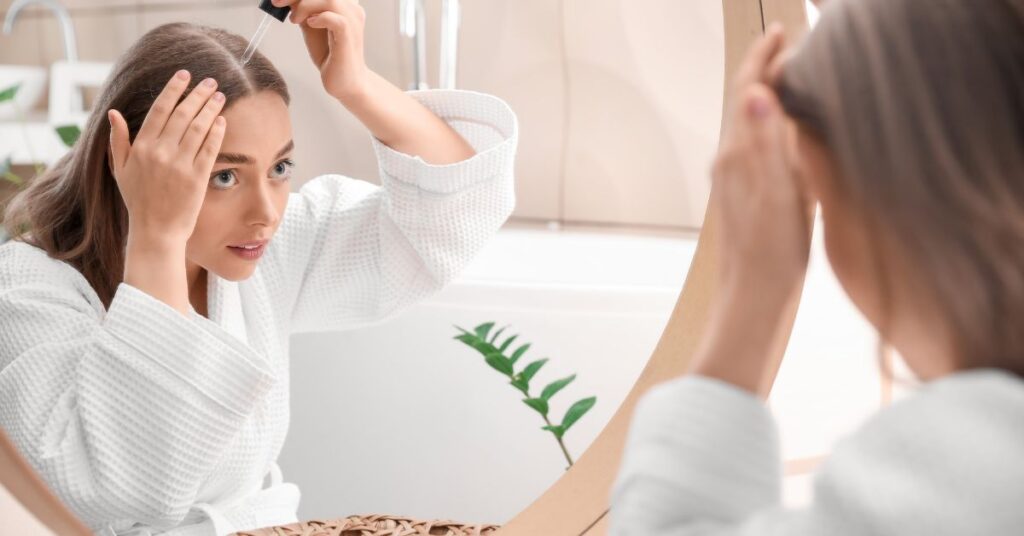
It also contains vitamins and minerals such as vitamin A, vitamin C,,, b vitamin E, and magnesium, which are important for hair growth and overall health. In addition, chlorophyll may help to detoxify the body, which can help to remove harmful toxins and promote a healthy environment for hair growth.
What are some tips for maintaining healthy hair?
Maintaining healthy hair can be achieved by following a few simple tips:
- Wash your hair regularly with a gentle shampoo: Washing your hair regularly helps to remove dirt and oil, but avoid over-washing as it can strip your hair of its natural oils.
- Condition your hair: Conditioning helps to hydrate and strengthen your hair, leaving it looking and feeling healthier.
- Avoid using hot tools: Overuse of heat styling tools like flat irons and blow dryers can damage your hair and cause split ends. Limit use and always use heat protectant products.
- Protect your hair from the sun: Too much sun exposure can damage your hair, causing dryness and breakage. Use a hat or scarf to protect your hair from the sun’s rays.
- Eat a healthy diet: A balanced diet rich in protein, vitamins, and minerals can help promote healthy hair growth.
- Stay hydrated: Drinking enough water helps to keep your hair hydrated, which can improve its overall health.
By following these tips, you can maintain healthy hair that looks and feels and growing healthy hair is great. Remember to be gentle with your hair and avoid harsh chemicals or practices that can damage it.
Can I Use Spirulina on My Hair?
There is some anecdotal evidence to suggest that spirulina may have benefits for hair health, such as promoting hair growth and improving hair texture. However, there is limited scientific research to support these claims.
Spirulina is a nutrient-rich supplement that may contribute to overall health and wellness, which can indirectly promote healthy hair growth. As with any new supplement or treatment, it is recommended to consult with a healthcare provider or dermatologist before use.
What supplements could cause hair loss?
Certain supplements, when taken in excess, may cause hair loss. These include vitamin A, vitamin E, selenium, and iron. Biotin supplements have also been known to cause hair loss in rare cases.
It is important to consult with a healthcare provider before starting any new supplements, especially if you are experiencing hair loss or have a history of hair loss in your family. A healthcare provider can help determine if the supplements you are taking are contributing to your hair loss and adjust your dosage or treatment plan accordingly.
Does consuming liquid Chlorophyll have any impact on the color of my hair?
There is no medical research or scientific argument to suggest that consuming liquid chlorophyll will impact the color of your hair. Chlorophyll is a green pigment that is naturally found in plants, and while it may temporarily stain the tongue or teeth green, it does not have any known effects on hair color.
However, it is important to follow the instructions on the label and consult with a healthcare provider before taking any supplements, including liquid chlorophyll or chlorophyll water.
Others Natural Remedies for hair growth
There are several natural remedies that can help promote hair growth and improve the overall health of your hair. Some effective options include massaging the scalp with essential oils, using natural hair masks made from ingredients such as honey and coconut oil, and taking supplements like biotin and vitamin E.
Additionally, maintaining a healthy diet and reducing stress levels can also play a role in promoting healthy hair growth. While these remedies may not work for hair strands of everyone, they are generally safe and can be a useful complement to traditional hair care routines.
Are there any negatives to taking chlorophyll?
Chlorophyll is generally considered safe for most people when taken in recommended doses. However, some people may experience side effects such as diarrhea, stomach cramping, or skin sensitivity. Those who are allergic to certain plants, such as ragweed or marigolds, may also be allergic to chlorophyll.
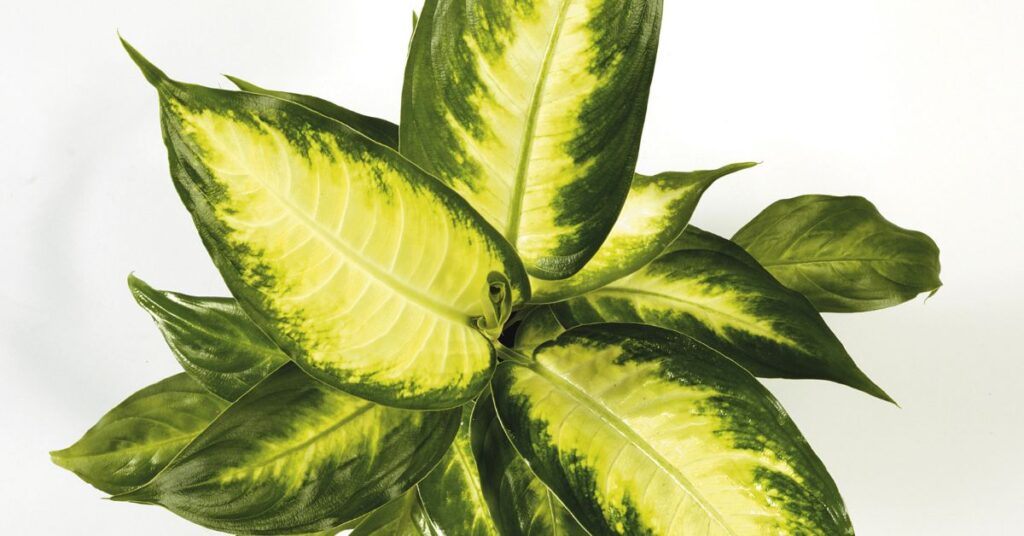
Additionally, those taking blood thinners should consult with a healthcare provider before taking chlorophyll as it may interact with certain medications. It is important to consult with a healthcare provider before starting any new supplements, especially if you have any underlying health conditions or are taking medication.
Is it bad to take chlorophyll supplements everyday?
Chlorophyll supplements are generally considered safe for most people when taken in recommended doses. However, it is important to follow the instructions on the label or to consult with a healthcare provider to determine the appropriate dosage for your needs.
While taking chlorophyll supplements every day is not necessarily bad, it is important to monitor your body’s response and discontinue use if you experience any negative side effects. It is also important to note that supplements should not be used as a substitute for a healthy diet and lifestyle.
Black Hair is Growing From These 2 Superfoods! Spirulina and Chlorella
FAQs
Is Chlorophyll safe to use?
Yes, chlorophyll is generally safe & positive effects to use as a food coloring and dietary supplement. However, it is important to follow the recommended dosage and to consult with a healthcare professional before using if you have any underlying medical conditions or are taking any medications.
Can Chlorophyll cause any side effects?
While chlorophyll is generally safe, it can cause some minor side effects such as diarrhea, cramping, and discoloration of the tongue and feces. These side effects are usually mild and go away on their own.
What are all the benefits of Chlorophyll?
Chlorophyll has several potential health benefits, including promoting healthy digestion, boosting the body and immune system, and detoxifying the human body. It may also have antioxidant properties and may help with wound healing.
How can I prevent hair loss?
While some types of hair loss are inevitable, there are steps you can take to keep your overall hair health up and prevent or slow down hair loss. Maintaining a healthy diet, avoiding harsh hair care practices, managing stress, using hair growth products, and seeking medical treatment can all help prevent hair loss.
Conclusion
In conclusion, there is no scientific evidence to suggest that chlorophyll causes hair loss. Hair loss can be caused by a variety of factors, including genetics, hormonal imbalances, stress, and medical conditions.
While some types of hair loss are inevitable, taking steps to maintain a healthy lifestyle and avoiding harsh hair care practices can help prevent or slow down hair loss. If you are concerned about hair loss, it is recommended to seek medical advice from a healthcare professional.
His research and writing have been featured in numerous publications, and he is dedicated to helping people understand the importance of these vital nutrients in maintaining optimal health. If you're looking to improve your well-being through diet and nutrition, Christopher is the expert to turn to.
- Can I Take Maca and Ashwagandha Together: YES! - January 7, 2024
- Can You Take Ashwagandha And Liquid Chlorophyll Together: YES! - January 7, 2024
- Can You Take Shilajit and Ashwagandha Together? - January 7, 2024


